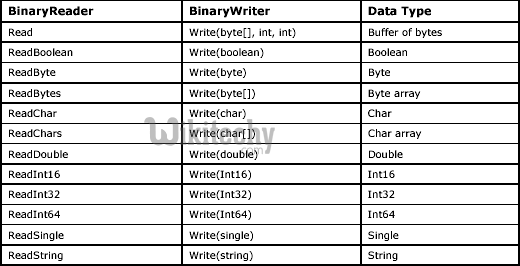| Name |
Description |
| Close() |
Closes the current BinaryWriter and the underlying stream. |
| Dispose() |
Releases all resources used by the current instance of the BinaryWriter class. |
| Dispose(Boolean) |
Releases the unmanaged resources used by the BinaryWriter and optionally releases the managed resources. |
| Equals(Object) |
Determines whether the specified object is equal to the current object.(Inherited from Object.) |
| Finalize() |
Allows an object to try to free resources and perform other cleanup operations before it is reclaimed by garbage collection.(Inherited from Object.) |
| Flush() |
Clears all buffers for the current writer and causes any buffered data to be written to the underlying device. |
| GetHashCode() |
Serves as the default hash function. (Inherited from Object.) |
| GetType() |
Gets the Type of the current instance.(Inherited from Object.) |
| MemberwiseClone() |
Creates a shallow copy of the current Object.(Inherited from Object.) |
| Seek(Int32, SeekOrigin) |
Sets the position within the current stream. |
| ToString() |
Returns a string that represents the current object.(Inherited from Object.) |
| Write(Boolean) |
Writes a one-byte Boolean value to the current stream, with 0 representing false and 1 representing true. |
| Write(Byte) |
Writes an unsigned byte to the current stream and advances the stream position by one byte. |
| Write(Byte[]) |
Writes a byte array to the underlying stream. |
| Write(Byte[], Int32, Int32) |
Writes a region of a byte array to the current stream. |
| Write(Char) |
Writes a Unicode character to the current stream and advances the current position of the stream in accordance with the Encoding used and the specific characters being written to the stream. |
| Write(Char[]) |
Writes a character array to the current stream and advances the current position of the stream in accordance with the Encoding used and the specific characters being written to the stream. |
| Write(Char[], Int32, Int32) |
Writes a section of a character array to the current stream, and advances the current position of the stream in accordance with the Encoding used and perhaps the specific characters being written to the stream. |
| Write(Decimal) |
Writes a decimal value to the current stream and advances the stream position by sixteen bytes. |
| Write(Double) |
Writes an eight-byte floating-point value to the current stream and advances the stream position by eight bytes. |
| Write(Int16) |
Writes a two-byte signed integer to the current stream and advances the stream position by two bytes. |
| Write(Int32) |
Writes a four-byte signed integer to the current stream and advances the stream position by four bytes. |
| Write(Int64) |
Writes an eight-byte signed integer to the current stream and advances the stream position by eight bytes. |
| Write(SByte) |
Writes a signed byte to the current stream and advances the stream position by one byte. |
| Write(Single) |
Writes a four-byte floating-point value to the current stream and advances the stream position by four bytes. |
| Write(String) |
Writes a length-prefixed string to this stream in the current encoding of the BinaryWriter, and advances the current position of the stream in accordance with the encoding used and the specific characters being written to the stream. |
| Write(UInt16) |
Writes a two-byte unsigned integer to the current stream and advances the stream position by two bytes. |
| Write(UInt32) |
Writes a four-byte unsigned integer to the current stream and advances the stream position by four bytes. |
| Write(UInt64) |
Writes an eight-byte unsigned integer to the current stream and advances the stream position by eight bytes. |
| Write7BitEncodedInt(Int32) |
Writes a 32-bit integer in a compressed format. |

